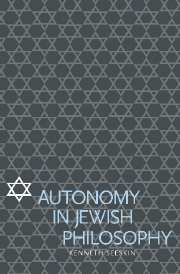Book contents
- Frontmatter
- Contents
- Preface
- Abbreviations
- 1 The problem of autonomy
- 2 Covenant and consent in the Bible
- 3 From the prophet to the sage
- 4 From the sage to the philosopher
- 5 The rise of modernity: Spinoza and Mendelssohn
- 6 The height of modernity: Kant and Cohen
- 7 Modernity under fire: Buber and Levinas
- 8 Conclusion: a partnership with God
- Bibliography
- Index
7 - Modernity under fire: Buber and Levinas
Published online by Cambridge University Press: 22 September 2009
- Frontmatter
- Contents
- Preface
- Abbreviations
- 1 The problem of autonomy
- 2 Covenant and consent in the Bible
- 3 From the prophet to the sage
- 4 From the sage to the philosopher
- 5 The rise of modernity: Spinoza and Mendelssohn
- 6 The height of modernity: Kant and Cohen
- 7 Modernity under fire: Buber and Levinas
- 8 Conclusion: a partnership with God
- Bibliography
- Index
Summary
The transition from transcendental idealism to existentialism can be viewed as a disagreement about the nature of God, the self, and one's fellowman. Cohen argued that these things must be understood in relation to each other. Buber agrees but does not think we should treat them as ideas. Recall that Cohen said we must consider not only what the moral law demands of us but whether it has life and actuality. Buber takes this to mean that we must direct our attention to how one concrete individual deals with another in real life. The result is that instead of correlation we get dialogue, and instead of rational construction, immediate encounter. According to Buber (EG pp. 14–15):
The more abstract the concept, the more does it need to be balanced by the evidence of living experience, with which it is intimately bound up rather than linked in an intellectual system. The further a concept seems from anthropomorphism, the more it must be organically completed by an expression of that immediacy and, as it were, bodily nearness which overwhelm man in his encounters with the divine … Anthropomorphism always reflects our need to preserve the concrete quality evidenced in the encounter; yet even this need is not its true root: it is in the encounter itself that we are confronted with something compellingly anthropomorphic, something demanding reciprocity, a primary Thou. This is true of those moments of our daily life in which we become aware of the reality that is absolutely independent of us.
- Type
- Chapter
- Information
- Autonomy in Jewish Philosophy , pp. 182 - 217Publisher: Cambridge University PressPrint publication year: 2001



